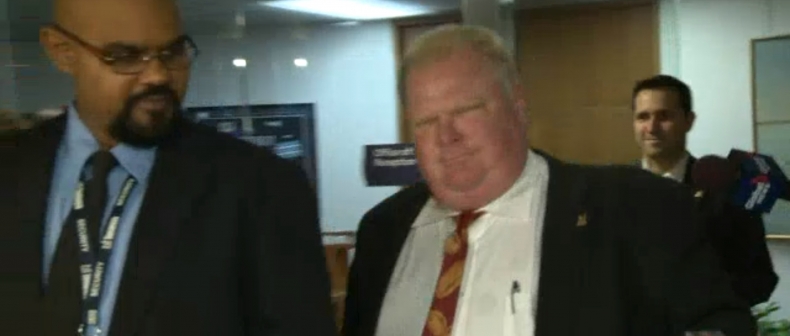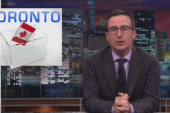
This week I refuse to write about the Scarborough transit debate or the police investigation of Mayor Ford. It is a principled boycott. The transit debacle is proof that there is no such thing as idiot proof. For what ought to be the last word on the topic, I direct you to Torontoist‘s brilliant calculator that demonstrates the LRT’s superiority. And what can be said when police conduct surveillance on our mayor and his associates from a plane? Does GTA stand for Greater Toronto Area, or Grand Theft Auto? To comment about this stuff seriously is to take a city hall article more seriously than city hall takes itself. But a tragically amusing scene played out at city hall Tuesday that summoned to mind thoughts about literature and words.
After the lunch break reporters waited outside Ford’s office for comment, or, as someone put it, to record his non-comment. The scrum waited, and when the mayor came out he was asked, “Are you under police investigation?” This straightforward question of considerable gravity shouldn’t easily be brushed aside. Ford’s only respond was absurd and incongruous, “Subways, subways, subways!” He darted to the elevator, laughing like The Joker as the doors shut, as Ed Keenan noted.
Think about this scene!
It brings together three things: Ford’s investigation by police, his proud obliteration of nuance, and his automatic contempt for professional journalists. Rarely does any cliché–in this case, Subways, subways, subways–communicate more. Nabokov absolutely trashed Dostoevsky’s Crime and Punishment for containing the following sentence: “The candle was flickering out, dimly lighting up in the poverty-stricken room the murderer and the harlot who had been reading together the eternal book.” Dostoyevsky’s artistic situation is cliché and sentimental–a killer’s spiritual redemption via a prostitute reading to him the bible is a forced and inartistic triangle. But Ford’s scene had no clunky melodrama. The cliché was uttered in a sleek and brilliantly crafted artistic passage. It’s only sad because it’s not fiction.
Since it is his defining feature, let’s examine just how Ford is a living cliché.
I take my article’s name from Orwell’s famous essay that describes the bi-directional relationship between paltry language and paltry thinking: “(Language) becomes ugly and inaccurate because our thoughts are foolish, but the slovenliness of our language makes it easier for us to have foolish thoughts.”
To be sure, sometimes very clear thinkers use clichéd speech deliberately for certain manipulative ends, and clichéd speech isn’t necessarily evidence of a clichéd mind. But Ford doesn’t seem to have this separation. His jaw dropping ignorance displayed in the exchange about LRTs with Josh Matlow was so painful to watch because it felt as if the curtains to Ford’s brain was pulled back and revealed nothing at all. Ditto during the conflict of interest case. His entire thinking consists of ready-made ideas and second-hand thoughts, and these find verbal expression in the only way possible, ready-made catchphrases, like “subways, subways, subways!” The lack of precision in speech and thought is identical, each inspiring the other. Whenever he says something banal or simplistic, he is literally speaking his mind.
Now it’s not as if the low language of his subway refrain convinced everyone of its merit, and subways are in fact necessary in some places. But there are people from Scarborough and elsewhere who reject the three-stop subway for being a ridiculously expensive way to get less transit than the cheaper LRT provided.
To transcend transit clichés, examine cases individually, then compare the data to the stated goals to reach the most sensible conclusion. Subways and LRTs are not brands (buy Axe to get all the chicks, build subways to be world class). In Ford’s shadow world of status symbols, transporting people effectively and efficiently is not the actual goal. It’s about manufacturing and assuaging his base’s insecurity. That’s why Ford’s language overlaps with the advertisers, avoiding the substance of the argument in favour of perception, appealing to fear and insecurity of self-image by talking about what folks ‘deserve.’
Remember, Ford literally has no clue what an LRT is (as demonstrated in the Matlow exchange). His guiding principles for hating LRT have no relation to statistics or the opinions of engineers who study transit, he probably just thinks LRTs are “gay.” Only macho cities governed by mayors with big SUVs and big cocks build subways. No LRT sissy shit for Scarborough. That’s for faggots, like Trudeau or the thousands of Torontonians who live and work along Eglinton.
Some might reasonably argue that Ford’s language isn’t strictly Orwellian. Ford doesn’t use inflated or pretentious diction or Latinisms. They’ll say his language doesn’t ascend, it descends. True, but while Orwell cautioned against high-flown pseudo-oratory, the essential thing is the vagueness. Language ought not to aim up or down, but must march straight ahead. Language is either precise or it isn’t.
Orwell denounced the right’s high-flown patriotic jingoism used to make ordinary young men willing to kill strangers abroad, but he also hated the vague euphemisms Marxists use to arouse class hatred. But he would no doubt object to Ford’s use of a dead repetitive phrase to appeal for subways. These three types of speech all aim at the gut. It seeks to bypass the intended audience’s rational faculty by striking a nerve as quickly as possible.
But Tuesday’s lightning fast press scrum saw Ford apply a new use for cliché, undreamed of by warmongers or Marxists. As if on a quest to pervert language even more, Ford used a cliché not as a weapon to undue city planning, but bent the already stupid phrase into a puny shield to get him past the media`s questions and into the elevator. It was the mayor’s brand of political stupidity used to brazenly mock journalists seeking comment about the police investigation targeting him. Subways, subways, subways. From a writer’s perspective, not a politician’s, this cliché, and any cliché, is blatantly in terrible taste. It is dead language hoping to persuade by repetition. I believe there’s truth in the saying, ‘bad taste leads to crime,’ but only the police will confirm if this applies specifically to Ford.
————
Jeff Halperin is a Toronto-based writer. You can follow him on Twitter @JDhalperin.
For more, follow us on Twitter @TorontoStandard and subscribe to our newsletter.














